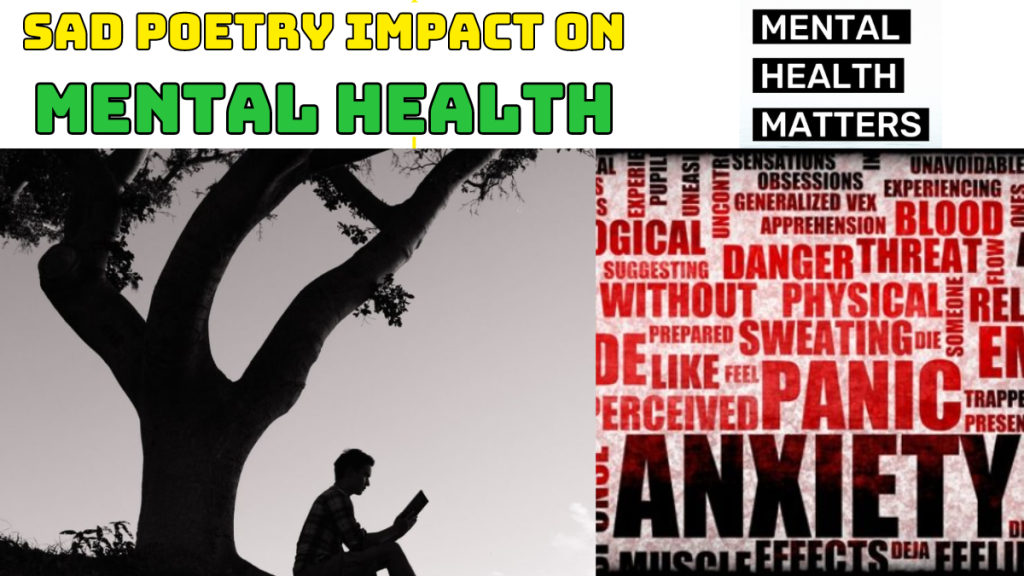
Sad poetry, a literary form as old as human emotions themselves, has captivated readers for centuries. But beyond the beauty of melancholy words, lies a potential for impacting mental health in profound ways. This article delves into the research and personal experiences surrounding sad poetry, exploring its ability to be both a cathartic release and a potential trigger.
Catharsis and Validation: The Healing Power of Sadness
Poetry’s ability to express complex emotions resonates deeply with those struggling with sadness, loss, or grief. A 2021 study published by the American Academy of Pediatrics found that hospitalized children who engaged with poetry saw reductions in fear, sadness, and anxiety. This suggests that sad poetry can act as a mirror, reflecting one’s own emotions and validating their experience.
Dr. Rachel Kelly, a mental health advocate, emphasizes the cathartic power of sad poetry. In a 2020 article for Medium, she cites a study where stroke patients found reading poetry to be a comforting experience, particularly poems that mirrored their own feelings of loss. This catharsis can be a crucial step in processing difficult emotions.
Finding Solidarity in Sorrow: Shared Experience
Sad poetry transcends the individual experience. By encountering another’s expression of sadness, readers discover they are not alone. A 2018 research paper published in “ResearchGate” highlights poetry’s ability to foster empathy and connection. Reading about someone else’s struggles can be a powerful reminder of the universality of human emotions.
This sentiment is echoed by countless readers. A 2023 blog post on mental health website MindWise Innovations features an interview with Sarah, a young woman who finds solace in sad poetry. Sarah states, “Reading poems about sadness…makes me feel less alone. It reminds me that other people have felt this way too, and somehow, that makes it easier to bear.”
Sad Poetry and Mental Health Risks
While sad poetry can be a powerful tool for navigating difficult emotions, it’s important to acknowledge potential risks. For individuals struggling with severe depression, constant exposure to sadness could exacerbate their symptoms.
A balanced approach is key. It’s important to be mindful of your own mental state when choosing to engage with sad poetry. If it starts to feel overwhelming, it might be beneficial to take a break and focus on more uplifting content.
Poetry as a Tool for Mental Well-being
The impact of sad poetry extends beyond simply mirroring sadness. Poetry’s beauty and metaphorical language can offer a sense of hope and resilience. Many poems explore themes of overcoming adversity and finding light in the darkness.
Furthermore, the act of writing or reading poetry itself can be a therapeutic tool. Poetry therapy, a growing field, utilizes poetry writing and analysis to help individuals process emotions and improve mental well-being.
A Palette of Emotions
Sad poetry is not a one-dimensional force for negativity. Research and personal experiences paint a complex picture, highlighting its potential for both catharsis and potential pitfalls. The key lies in approaching sad poetry mindfully, using it as a tool for exploration and growth, while recognizing its limitations.
As with any art form, the impact of sad poetry is subjective. Ultimately, it’s up to the individual to decide whether engaging with sadness in verse offers solace or submerges them further into darkness.
Poetry in a Digital Age
The digital age has opened new avenues for experiencing and creating poetry. Social media platforms like Button Poetry and Instagram are fostering vibrant communities of sad poetry enthusiasts. These online spaces offer a platform for connection and shared experiences, potentially amplifying the positive mental health impacts of sad poetry.
Citations:
[1] American Academy of Pediatrics (2021). Poetry therapy reduces fear, sadness, and anxiety in hospitalized children. [press release] Retrieved from https://pubmed.ncbi.nlm.nih.gov/33622762/
[2] Kelly, R. (2020, September 10). The Therapeutic Power of Poetry: What’s the Evidence? Medium. https://www.inspirethemind.org/post/the-therapeutic-power-of-poetry-what-s-the-evidence
[3] Wasmer Andrews, L. (2018, September 11). Poetry as a way to express emotions in mental health. ResearchGate. https://www.researchgate.net/publication/351433036_Poetry_as_a_way_to_express_emotions_in_mental_health
[4] MindWise Innovations. (2023, February 14). Speaking Up: How Poetry Can Give a Voice to Mental Health.

Dwayne Paschke specializes in writing, management, development, design and Search Engine Optimization. Although he has worked for 8 years in the industry, he never found an ideal person to work with as a partner. Later, he found Sebastian Pearson, and they both found specific understanding between them. Both of them divided their tasks in this project and are running this venture successfully.
